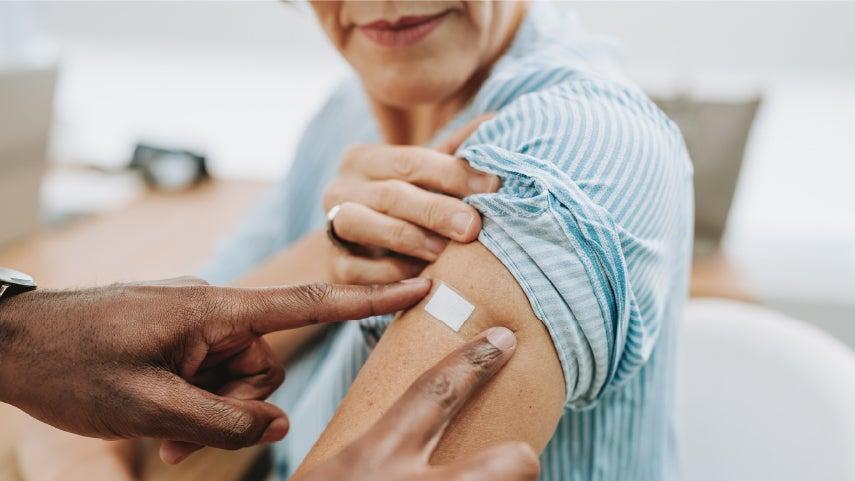
Related Topics
Odds are you’ve heard of shingles—a common illness known for its fiery rash and painful blisters. This condition affects millions of older adults every year, and roughly 1 in 3 Americans will develop shingles in their lifetime.1
If you or someone you know has been diagnosed with shingles, you may wonder, “Is shingles contagious?” While the illness itself is not contagious in the same way a cold or the flu is, the virus that causes shingles is transmissible. Keep reading to find out what you need to know.
What is shingles?
Also known as herpes zoster, shingles is a viral infection that causes a blistery skin rash. It’s more likely to occur in people over 50. The culprit behind shingles is the varicella-zoster virus (VZV)—the same virus that causes chickenpox. If you’ve had chickenpox in the past—like more than 99% of Americans born before 19801—the virus stays dormant in your body, hiding in nerve tissues. It can stay dormant for many years, or even a lifetime. As our immune system weakens with age, the virus can reactivate in some people, leading to an active case of shingles.
“Basically, as you get older, the chance of you getting shingles increases. So, most people who get shingles are age 50 and above,” Florida-based physician Ankush Bansal, MD told the American Medical Association (AMA). “And every 10 years above that, your chance of getting shingles increases.”
Shingles often begins with symptoms like tingling, burning, or itching in a specific area, followed by the appearance of a rash that turns into painful blisters (usually on one side of the body). The pain can range from mild to severe. In some cases, debilitating pain can persist for months or even years after the rash clears up—a condition known as postherpetic neuralgia (PHN) that affects about 10% to 18% of people who have shingles.2
Other shingles complications include infection and vision loss. A new study has also linked shingles with a 20% higher long-term risk of cognitive decline.3
Is shingles contagious?
The short answer is that shingles itself is not contagious, meaning you cannot catch shingles from someone who has it. However, the varicella-zoster virus that causes shingles can be spread from a person with an active shingles rash to someone who has never had chickenpox (or has not been vaccinated against it). In these cases, the person exposed to the virus will develop chickenpox, not shingles. Note: People with active chickenpox are more likely to spread VZV than people who have shingles.
How is shingles spread?
The varicella-zoster virus is spread through direct contact with fluid from the blisters of the shingles rash. This is most likely to happen when the rash is in the blister phase, since blister fluid is filled with virus particles. VZV can also be spread when a person breathes in virus particles that come from the blisters of someone with an active shingles infection.
How long is shingles contagious for?
Once the rash has crusted over, which takes about seven to 10 days, the risk of transmission is greatly reduced.
Who is most at risk for getting infected with the shingles virus?
Is it safe being around someone with shingles? Is it ok to hug someone who has shingles? Those most at risk for getting chickenpox from someone with shingles include people who have never had chickenpox and have not received the chickenpox vaccine.
If you already had chickenpox when you were a child, being exposed to someone with shingles does not mean you will get it. Shingles results from the reactivation of the virus that’s already in your body—not from being exposed to someone else with the condition.
How can I avoid infecting others with the shingles virus?
If you have shingles, there are steps you can take to protect others, especially those who may be at higher risk for serious complications from chickenpox:
- Cover the rash: Keep your shingles rash clean and covered with clothing or a bandage to reduce the risk of contact with fluid from the blisters.
- Avoid high-risk people: Stay away from pregnant women, newborn babies, and people with a compromised immune system until your rash has crusted over.
- Practice good hygiene: Wash your hands frequently (for at least 20 seconds). Avoid scratching the rash, since this can spread the virus to other areas or to other people.
- Do not share personal items: Avoid sharing items like clothing, towels, or bed linens with others while you have an active shingles rash.
Can the shingles vaccine help?
There is one vaccine approved by the U.S. Food and Drug Administration (FDA) to protect against shingles: a recombinant zoster vaccine called Shingrix (RZV). This vaccine is recommended by CDC and has been shown to be 90% effective at preventing shingles and PHN in healthy adults age 50 and older.4
The Shingrix vaccine is given in two doses, usually two to six months apart. CDC recommends Shingrix for adults age 50 and older and adults age 19 and older who have weakened immune systems due to disease or therapy.
If you’re age 50 or older and have not yet received the shingles vaccine, talk to your health care provider about getting vaccinated. It’s the only way to protect yourself against shingles and its potentially devastating complications.
Even if you received the prior shingles vaccine—Zostavax, which was discontinued in November 2020—it is still recommended for you to get the Shingrix shot. Talk to your health care provider about the best timing to get Shingrix.
What’s another good reason to get the shingles shot? UK researchers recently published some eye-opening study findings: They discovered older Americans who received Shingrix exhibited a 17% lower rate of developing dementia compared to those who received the since-discontinued Zostavax vaccine.5 Women were more likely than men to experience this protective effect.
The shingles vaccine joins several others linked to a reduced dementia risk, including the flu vaccine and Tdap vaccine.
I think I might have shingles. What should I do?
Shingles typically starts with pain, itching, or a tingling sensation on your skin. This can happen several days before a rash appears. In most cases, the shingles rash emerges as a stripe around the right or left side of your body and looks similar to a chickenpox rash. Sometimes, it may show up on one side of your face. Along with the telltale rash, you may have a fever and/or chills, a headache, or gastrointestinal issues.
If you suspect you have shingles, it’s important to seek medical care right away. When started within 72 hours of the appearance of the rash, treatment with antiviral medications like acyclovir, valacyclovir, or famciclovir can help reduce the severity of your symptoms, shorten the duration of your illness, and prevent complications like postherpetic neuralgia.
“Older adults face a uniquely increased risk for shingles because it’s more likely to emerge with age. In addition, older adults are at higher risk for severe complications like painful postherpetic neuralgia which can have a significant impact on quality of life,” said Kathleen Cameron, former Senior Director of NCOA’s Center for Healthy Aging.
Getting vaccinated is one simple but powerful action you can take to avoid the misery of shingles and protect your health,” Cameron said.
Sources
1. Centers for Disease Control and Prevention (CDC). About Shingles (Herpes Zoster). Found on the internet at https://www.cdc.gov/shingles/about/index.html
2. Centers for Disease Control and Prevention (CDC). Shingles Symptoms and Complications. Found on the internet at https://www.cdc.gov/shingles/signs-symptoms/index.html
3. Tian-Shin Yeh, et. al. Herpes zoster and long-term risk of subjective cognitive decline. Alzheimer's Research & Therapy. August 14, 2024. Found on the internet at https://alzres.biomedcentral.com/articles/10.1186/s13195-024-01511-x
4. Centers for Disease Control and Prevention (CDC). Shingles Vaccination. Found on the internet at https://www.cdc.gov/shingles/vaccines/index.html
5. Maxime Taquet, et al. The recombinant shingles vaccine is associated with lower risk of dementia. Nature Medicine. July 25, 2024. Found on the internet at https://www.nature.com/articles/s41591-024-03201-5




